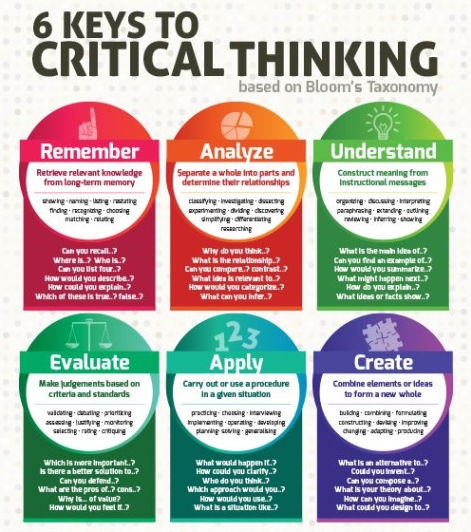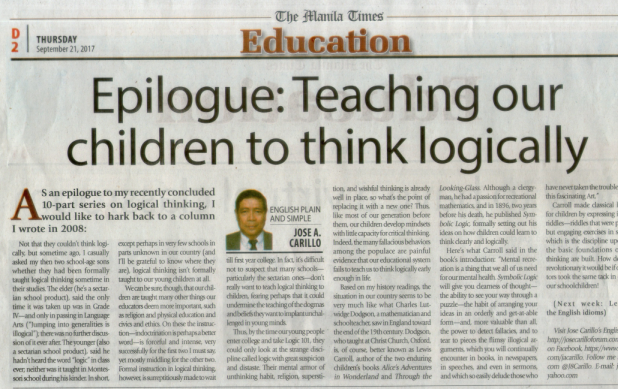As an epilogue to my recently concluded 10-part series on logical thinking, I would like to hark back to a column I wrote in 2008:
Not that they couldn’t think logically, but sometime ago, I casually asked my then two school-age sons whether they had been formally taught logical thinking sometime in their studies. The elder (he’s a sectarian school product), said the only time it was taken up was in Grade IV—and only in passing in Language Arts (“Jumping into generalities is illogical”); there was no further discussion of it ever after. The younger (also a sectarian school product), said he hadn’t heard the word “logic” in class ever; neither was it taught in Montessori school during his kinder. In short, except perhaps in very few schools in parts unknown in our country (and I’ll be grateful to know where they are), logical thinking isn’t formally taught to our young children at all.

We can be sure, though, that our children are taught many other things our educators deem more important, such as religion and physical education and civics and ethics. On these the instruction—indoctrination is perhaps a better word—is forceful and intense, very successfully for the first two I must say, yet mostly middling for the other two. Formal instruction in logical thinking, however, is surreptitiously made to wait till first year college. In fact, it’s difficult not to suspect that many schools—particularly the sectarian ones—don’t really want to teach logical thinking to children, fearing perhaps that it could undermine the teaching of the dogmas and beliefs they want to implant unchallenged in young minds.

Thus, by the time our young people enter college and take Logic 101, they could only look at the strange discipline called logic with great suspicion and distaste. Their mental armor of unthinking habit, religion, superstition, and wishful thinking is already well in place, so what’s the point of replacing it with a new one? Thus, like most of our generation before them, our children develop mindsets with little capacity for critical thinking. Indeed, the many fallacious behaviors among the populace are painful evidence that our educational system fails to teach us to think logically early enough in life.
Based on my history readings, the situation in our country seems to be very much like what Charles Lutwidge Dodgson, a mathematician and schoolteacher, saw in England toward the end of the 19th century. Dodgson, who taught at Christ Church, Oxford, is, of course, better known as Lewis Carroll, author of the two enduring children’s books
Alice’s Adventures in Wonderland and
Through the Looking-Glass. Although a clergyman, he had a passion for recreational mathematics, and in 1896, two years before his death, he published
Symbolic Logic, formally setting out his ideas on how children could learn to think clearly and logically.
Here’s what Carroll said in the book’s introduction: “Mental recreation is a thing that we all of us need for our mental health.
Symbolic Logic will give you clearness of thought—the ability to see your way through a puzzle—the habit of arranging your ideas in an orderly and get-at-able form—and, more valuable than all, the power to detect fallacies, and to tear to pieces the flimsy illogical arguments, which you will continually encounter in books, in newspapers, in speeches, and even in sermons, and which so easily delude those who have never taken the trouble to master this fascinating Art.”
Carroll made classical logic easy for children by expressing it through riddles—riddles that were perplexing but engaging exercises in semantics, which is the discipline upon which the basic foundations of logical thinking are built. How delightfully revolutionary it would be if our educators took the same tack in educating our schoolchildren!
(Next week:
Learning the English idioms) September 28, 2017
 This essay appeared in the column “English Plain and Simple” by Jose A. Carillo in the Education Section of the September 21, 2017 issue (print edition only) of
This essay appeared in the column “English Plain and Simple” by Jose A. Carillo in the Education Section of the September 21, 2017 issue (print edition only) of The Manila Times
, © 2017 by the Manila Times Publishing Corp. All rights reserved.READ THE FORUM'S 12-PART SERIES ON LOGICAL THINKING IN FULL:1. “The need for logical thinking in our everyday life”2. “Watching out against the material fallacies – 1”3. “Watching out against the material fallacies – 2”4. “Watching out against the material fallacies – 3”5. “Watching out against the fallacies of relevance– 1”6. “Watching out against the fallacies of relevance – 2”7. “When faulty logic overrides good grammar and semantics”8. “Watching out against the fallacies of relevance – 3”9. “Watching out against the fallacies of relevance – 4”10. “Watching out against the verbal fallacies – 1”11. “Watching out against the verbal fallacies – 2”12. Epilogue: “Teaching our children to think logically” (This post)